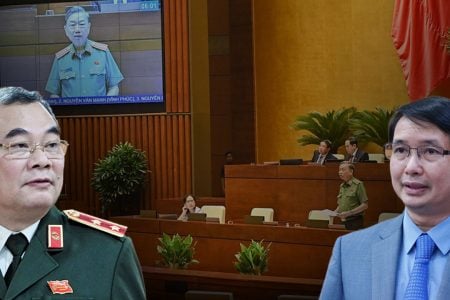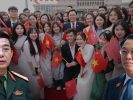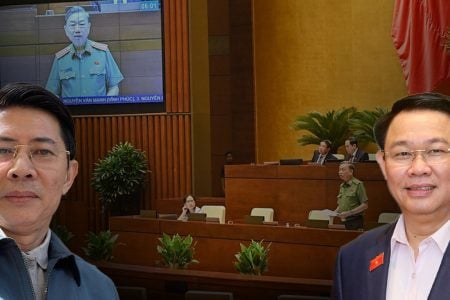
One of the military development strategies for the coming time is to protect the Fatherland on cyberspace, that is the “mission on a new territory,” Lieutenant General Nguyen Trong Nghia – Deputy Director of the Political General Department of the Vietnam People’s Army, speaking as just mentioned when responding to the press on the sidelines of the 13th National Congress of the ruling Communist Party of Vietnam (CPV), on January 26.
According to Mr. Nghia, along with the task of protecting sovereignty and territory, over the past time, the military must also have a strategy to protect the Fatherland on cyberspace, a strategy on cybersecurity. General Nghia also cited the military’s specialized force as Command 86.
Responding to RFA on January 27 from Saigon, activist Tran Bang said:
“Mr. Nguyen Trong Nghia said that the Army will participate strongly in cyber activities to protect the Fatherland … if it is right to protect the Fatherland, protect the people, against hackers, and protect its military information, information security against invading enemies such as China or other forces that may infringe upon the sovereignty of islands, steal technology, endanger aviation, maritime … is good.”
According to activist Tran Bang, if that were the case, then it would have to use both the military and the police because it was absolutely necessary. However, he continued:
“What about if Mr. Nguyen Trong Nghia says that the Army will participate strongly in cyber activities to suppress opposing voices, it is harming the people, harming the country … not good. Because it is the opposing voices that are good for the country’s sovereignty, good for the interests of the people. The interests of the people include freedom of speech, freedom of scholarship, freedom of personal correspondence … ie protection of the people’s right to personal correspondence.”
Although he did not acknowledge the control of opposing voices, Lieutenant General Nguyen Trong Nghia also said that when the peak of the Covid-19 pandemic happened in Vietnam, the military promptly handled seriously the cases in which people were accused of misrepresentation of information about the pandemic.
Responding to RFA from Vietnam on January 27, Mr. Vu Minh Tri, before retiring as Lieutenant Colonel at General Department 2, said:
“I think there are two agencies in Vietnam, the Ministry of Defense and the Ministry of Public Security, with two completely separate functions, basically overlapping, so if there is a Law on Cyber Security and the Ministry of Public Security is in force having specialized units, the Ministry of Public Security should do the whole thing. The army should only perform in its own scope, that is to protect the security of the army’s network, not protect the network of the whole country. Just like we are ordinary citizens, we protect our own networks, not neighbors’ networks.”
Explaining the overlap with the Ministry of Public Security, General Nghia said that the essence of performing this task was to build an all-people defense and the entire people’s defense posture associated with the people’s security posture in the cybersecurity in which, the armed forces, the Central Propaganda Department, the Ministry of Information and Communications, etc. all participate.
After the Law on Cyber Security, after the Ministry of Public Security arrested and imprisoned online dissents, so is the military’s participation in cybersecurity protection a step to increase the suppression of freedom of expression? What do people say about this?
Mr. Tran Dinh Thu in Saigon, when speaking to RFA on January 27, said:
“Regarding the military control of cybersecurity, it sounds serious, but in fact they only let a few tens of thousands of soldiers swear at the netizens. They set up a few pages and post their style, they told them to listen. From time to time, if anyone posts a status that they find tickling, about a few dozen men pull each other in and swear with netizens, both sides swear back and forth. So in my opinion it is also harmless, does not affect the freedom of speech when the army joins. Of course, the situation of freedom of speech is pretty bad, but it doesn’t mean much for the military’s participation. Only the police makes sense.”

Mr. Dinh Van Hai, a resident of Saigon, when he replied to RFA on January 27, saying that mobilizing the army to participate in protecting the Fatherland on cyberspace, is actually a useless job:

“In the past, there was the Department of C50 for hi-tech crime prevention and network security. The result was: Former team of General Vinh, General Hoa, and other subordinates used means and equipment to organize online gambling, earning a huge amount of money. Now, mobilizing the army to participate in protecting the Fatherland in cyberspace, is actually a pointless job. Its purpose is to increase control over thoughts, indoctrinate opinions and misconceptions, in order to enslave soldiers’ thoughts.”
On November 30, 2018, the People’s Court of Phu Tho province declared 9 years in prison to former police lieutenant-general of the General Department of Police Phan Van Vinh and 10 years in prison to former Major General Nguyen Thanh Hoa, former general director of the C50 High-Tech Crime Prevention Department, for its involvement in a trillion online gambling line.
Former Vietnam People’s Army captain Vo Minh Duc, when answering RFA from Ho Chi Minh City on January 27, said:
“The suppression of freedom on cyberspace is very clear, since the Law on Cyber Security, even before that, they have launched cyber-activists for malicious information against the state. However, this force said that the fight was not right, they went up to do things that were very culturally lacking. Their public opinion and curse at dissident intellectuals, social critics … are very vulgar.”
But in fact, according to Mr. Vo Minh Duc, the people or dissidents, those who fight for democratic freedom in Vietnam today, only tell the truth, what is happening in life. He gave the example:
“For example, they say that the law enforcement agency does not respect the law, the injustices of the people, the negative or bad habits of the official … they say the truth is supported by evidence. In addition, those who play Facebook can read the information at all, but the gagging opinion of the state has long existed. The statements or intentions of the heads of the police or the army, they all want to please the top leaders, they always want to show themselves as the sword, the best shield of the party. But the function of these two agencies is to protect the country, to protect the people, to protect the safety of social order, not to do it. In my opinion, that policy is not only a violation of freedom of speech, not just the function of the armed forces, but also very offensive.”
General Nguyen Trong Nghia himself in December 2017 said, “The Central Military Commission is very concerned, building up a standing force that refutes wrong views. The ideological security guard force in the army has also developed and there will be a dedicated force in charge of cyber combat.” It is “Force 47” that has more than 10,000 people fighting in space. network “both loyal to the party and professional.”
Vietnam’s cybersecurity law came into effect on January 1, 2019, despite objections from many people and internationally because of provisions that were supposed to further limit the people’s right to freedom of expression.
According to The Project 88 page, in 2020, 20 people will be imprisoned and sentenced to prison by the Vietnamese government for expressing their peaceful opinions on social and economic issues. Human Rights Watch evaluates 2020 as the year when human rights in Vietnam are seriously degraded
In the 2019 Report on political prisoners and at-risk activists in Vietnam, published by Project 88 on June 23, 2020, in 2019, 41 people in Vietnam were arrested for moderation. their tie.
Mr. Vu Minh Tri said that basically the government cannot terrorize or silence all people, especially when the network is thriving as it is now, it is impossible. Because it is impossible to capture people like Mr. Pham Chi Dung or Nguyen Tuong Thuy, or Pham Thanh … if there are hundreds of thousands of them. So, according to him, the more the government tries to control the people like that, the more it will show the face of disgrace, anti-democracy, and anti-freedom of expression.
Thoibao.de (Translated)





























